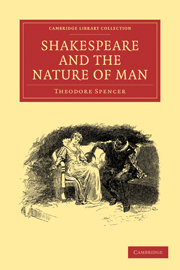Book contents
- Frontmatter
- Preface
- Contents
- SHAKESPEARE and THE NATURE OF MAN
- I Man in Nature: the Optimistic Theory
- II Man in Nature: the Renaissance Conflict
- III The Dramatic Convention and Shakespeare's Early Use of It
- IV Hamlet and Troilus and Cressida
- V Othello and King Lear
- VI Macbeth and Antony and Cleopatra
- VII Shakespeare's Last Plays
- VIII Literature and the Nature of Man
- Index
IV - Hamlet and Troilus and Cressida
Published online by Cambridge University Press: 07 September 2010
- Frontmatter
- Preface
- Contents
- SHAKESPEARE and THE NATURE OF MAN
- I Man in Nature: the Optimistic Theory
- II Man in Nature: the Renaissance Conflict
- III The Dramatic Convention and Shakespeare's Early Use of It
- IV Hamlet and Troilus and Cressida
- V Othello and King Lear
- VI Macbeth and Antony and Cleopatra
- VII Shakespeare's Last Plays
- VIII Literature and the Nature of Man
- Index
Summary
At the beginning of the seventeenth century, Shakespeare had behind him ten years of successful play-writing. He had proved himself a master of comedy, of the chronicle play, of a certain kind of tragedy, and he had proved himself a master of plot-construction, of character and blank verse. He had brilliantly developed the dramatic conventions given him by his time and he had admirably used the traditional sixteenth-century beliefs about man's nature as a mine for metaphor, as a means of describing character, and as a means of defining values by which character and action could be understood.
Toward the end of this period, as many students of Shakespeare have pointed out, there are indications of increasing seriousness, an anticipatory clouding over of Shakespeare's view of the human situation. His half-satiric, half-sympathetic portrayal of the melancholy Jaques in As You Like It, a tone of something alien to comedy in Twelfth Night, the seriousness which he gives to the character of Brutus in Julius Caesar, all appear to foreshadow the presentation of evil which is the basis of the later tragedies. In Hamlet evil appears full-fledged, and we have a very different kind of tragedy from anything that Shakespeare had previously written. For with Hamlet we feel as if Shakespeare had had a new vision of what a play could contain, and in this play, as in the other tragedies that follow it, the characters and events become larger than the characters of the 1590's; they make more reverberations in our minds; they take on a symbolic and universal meaning.
- Type
- Chapter
- Information
- Shakespeare and the Nature of Man , pp. 93 - 121Publisher: Cambridge University PressPrint publication year: 2009First published in: 1943

